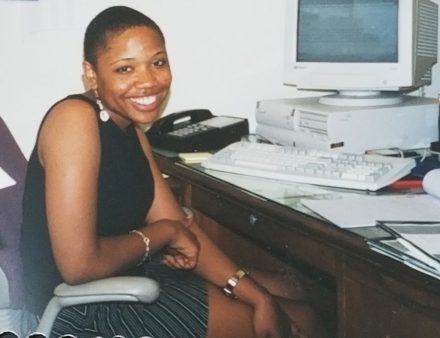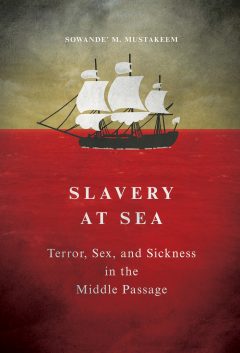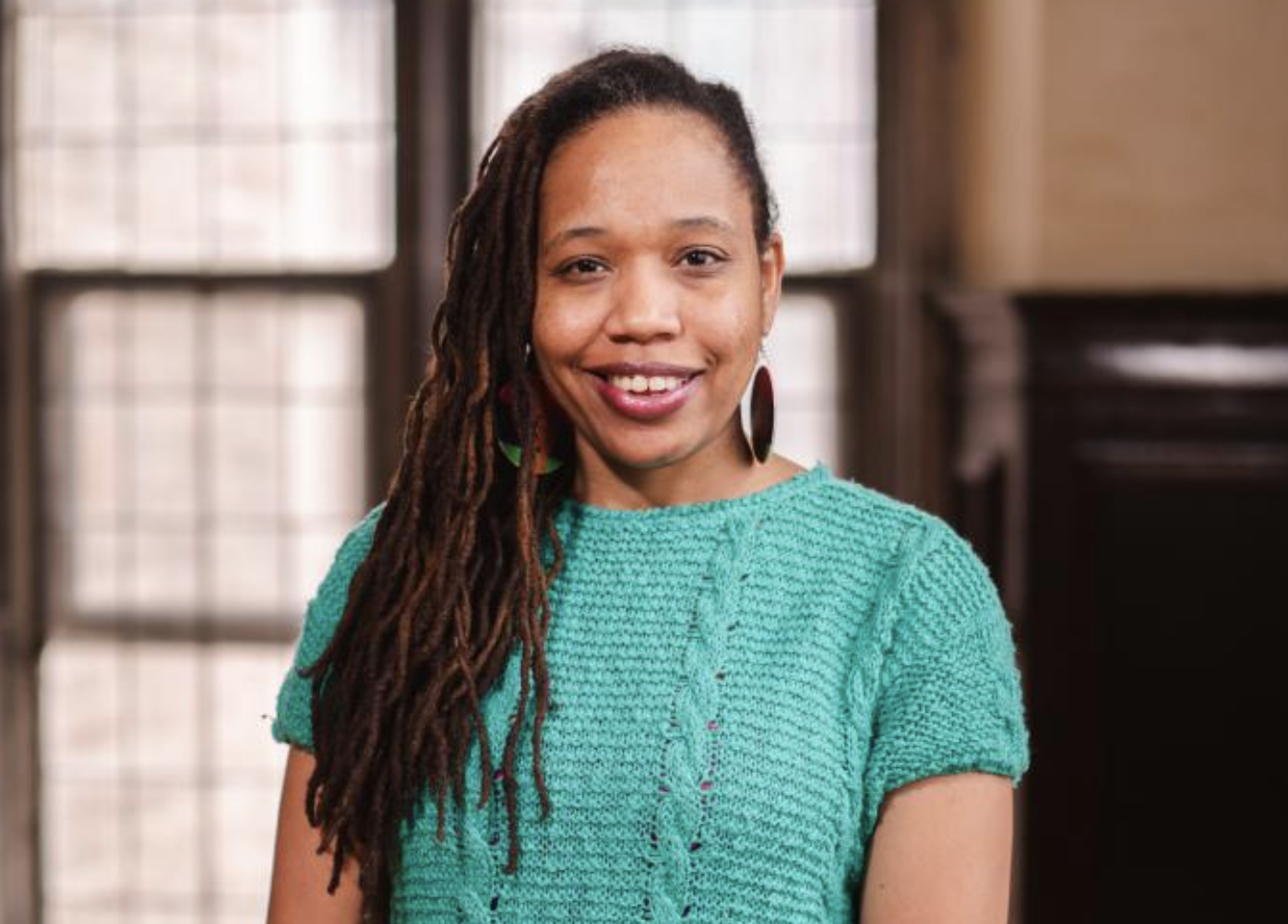Sowande’ Mustakeem ’00, author of “Slavery at Sea: Terror, Sex and Sickness in the Middle Passage,” shares her story of loss, triumph and success, since graduating as Elon’s first African & African-American Studies major.
Oct. 25, 1997, is a day Sowande’ Mustakeem will never forget. That’s when she and two friends traveled to Philadelphia, joined by roughly 750,000 other Black women, to cry out for social and economic development in America’s Black community. That event – the Million Woman March – would prove to be a pivotal point in Mustakeem’s story.
It was a spark that would ignite in her a deeper love for Black history and redirect her toward becoming a leading scholar in the field. The experience would propel her to become an award-winning author whose work is on display at the Smithsonian’s National Museum of African American History and Culture. She would become the first Black professor to earn tenure in the Department of History at Washington University in St. Louis, where she still teaches today.
As she looks back on all she’s accomplished since that life-changing trip to Philadelphia 24 years ago, Mustakeem is grateful and understandably amazed by where her story has taken her.
“If someone had told me then ‘you’re going to leave a mark,’ I wouldn’t have understood it,” Mustakeem said. “I couldn’t have understood it.”
The march happened during Mustakeem’s sophomore year, as the Atlanta native was in the middle of a bit of a soul search. She wasn’t quite sure what she wanted to do after college, so she considered majoring in computer science like her mom. Then her interests shifted to communications, and finally, a business major with a minor in African & African-American Studies.

Raised to know and appreciate Black history and culture, Mustakeem was excited to pursue one of her passions in college. The Million Woman March turned out to be the perfect opportunity to jumpstart that learning experience while proving a few doubters – those who advised against a career in studying the Black experience – wrong.
“I would come back even more clear that there was a future in Blackness,” Mustakeem said.
That realization became the guiding light for her college experience and career. With encouragement from Professor of History Mary Jo Festle, Mustakeem set out to become the first Elon student to graduate with not just a minor, but a major in African & African-American Studies. She developed her own curriculum, which included Black studies, history, sociology, music and English courses, while also successfully defending the proposal before a faculty panel.
“I was fueled by what I could feel – that no one could imagine where we are now,” Mustakeem said. “Once I could see the collective good coming, there was no stopping me.”
Mustakeem’s passion followed her to graduate school where she earned a master’s degree in African & African-American Studies from The Ohio State University and later a doctorate in Comparative Black History from Michigan State University. Throughout her studies, Mustakeem developed a deep interest in Blackness in the 18th century – specifically, the violent uprooting, shipment and enslavement of Africans in the 1700s. Mustakeem taught herself to read 18th-century script and traveled to 25 archives around the world to collect information for a 400-page dissertation on the Middle Passage, the violent transport of enslaved people from Africa to the Americas. “I knew I was onto something,” Mustakeem said.
And she was right, as just a few years later, her work would be featured prominently in one of Washington, D.C.’s most highly regarded museums.

In 2017, Mustakeem’s research culminated in “Slavery at Sea: Terror, Sex and Sickness in the Middle Passage,” a first-of-its-kind book focusing on the traumatic journey of purchased captives as they crossed the sea to America aboard slave ships. Instead of focusing on often told stories of injustice and mistreatment on slave plantations, “Slavery at Sea” highlights the untold stories of terror enacted on slaves as they were transported across the Atlantic Ocean.
“I was driven by what do you do when no one’s looking,” Mustakeem said. “What do you do when you’re out in the middle of the ocean and there are no rules? How far will humans go in the mistreatment of others?”
“Slavery at Sea” has garnered worldwide attention, winning the American Historical Association’s Wesley-Logan Prize, the Dred Scott Freedom Award, and twice being named to The Washington Post’s “Must Reads” list. The book and its accompanying soundtrack are now on display in the Smithsonian’s National Museum of African American History and Culture in the nation’s capital. While the honor was unexpected, it removed all doubts for Mustakeem about her abilities and the role her work could play in future conversations.
“It shows there is a future in all of this magnificence,” Mustakeem said. “To think back to 16-17 years ago at all the predictions that were wrong. And now look, the book is going to outlive all of us.”
It was while writing a world-renowned book that Mustakeem became the first Black professor to earn tenure in the Department of History at Washington University in St. Louis. At the same time she was taking care of a mother who had suffered five strokes in a year and coping with the death of a father who had been away in prison for much of her life. Amid all the pain and struggle, Mustakeem saw writing as an outlet.
“I began to look at what it was like in this business world of slavery and seeing that other people’s lives were far worse than mine,” she said. “So I used the energy to tell their stories while moving through my own, and that became its own form of meditation.”
While she’s been previously reluctant to share her own pain, Mustakeem now understands the value in sharing her story and the untold stories of others. In fact, it’s become the foundation for the lessons she now teaches at Washington University.
Mustakeem has developed eight courses focusing on untold stories of Blackness – “Black Women’s History,” “Medicine, Healing and Experimentation in the Contours of Black History,” and “Mapping the World of ‘Black Criminality,’” to name a few. Each course focuses on the uncomfortable stories in history that reflect on people and human nature, as opposed to romanticizing over iconic narratives. As Mustakeem puts it, she wants students to “navigate the blood,” or take an intentional look at important narratives anchored in bloodshed and death.
“I tell my students to navigate the blood because other people don’t want to deal with it,” Mustakeem said. “It’s not about the ‘first’ or the ‘iconic,’ it’s not about the feel-good. It’s about seeing a more textured world that includes the high and low vibration of people.”
Mustakeem also wants students to understand how stories of the past relate to the events of today. At no time have those lessons been more meaningful than after of summer of social unrest in response to the deaths of George Floyd and Breonna Taylor at the hands of police. These killings – and the outcry that followed – have compelled Mustakeem to become more intentional about making sure her message reaches varying groups, both in her classrooms and beyond.
“I’m not trying to create another me,” she said. “I want my students to go into the world and dig even deeper into complex questions about how we can move forward.”
As she continues to educate the next generation of change agents, Mustakeem will continue telling untold stories. She’s currently working on a second academic book focusing on the treatment of Black and White women convicted of violent crimes and sent to the Missouri State Penitentiary. The book will add to a catalogue that also includes three self-published books on numerology, symbology and understanding one’s self. Mustakeem also co-hosts a podcast, “The Book Lane 365 with Mustakeem and Meg,” which offers tips for authors looking to turn an idea into a published book.
Last March, Mustakeem returned to speak at Elon during a celebration of the African & African-American Studies program’s 25th anniversary. It gave her a chance to reconnect with campus and celebrate the faculty – like Festle, Wilhelmina Boyd (founder of Elon’s African & African-American Studies program), and Professor of Music Thomas Erdmann – who believed in her along the way.



